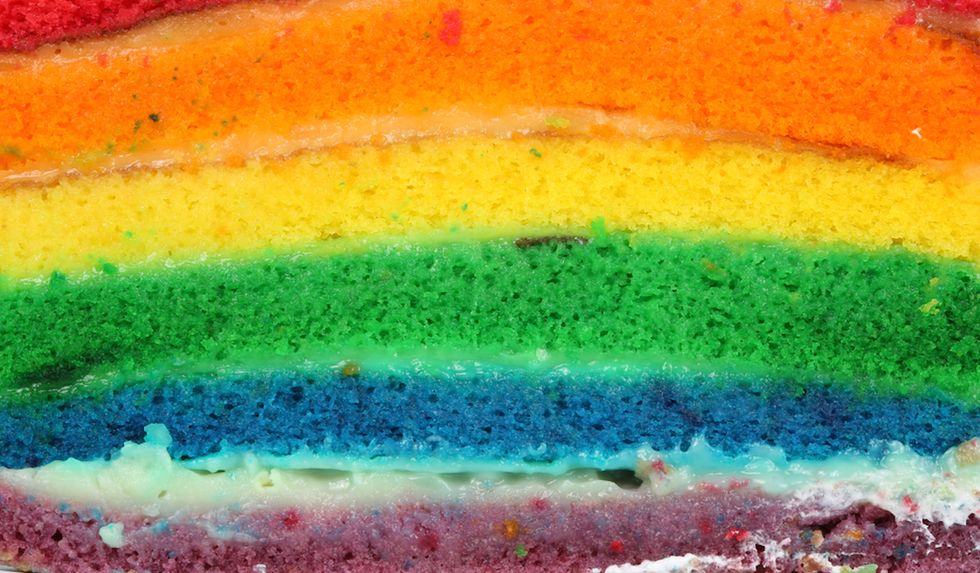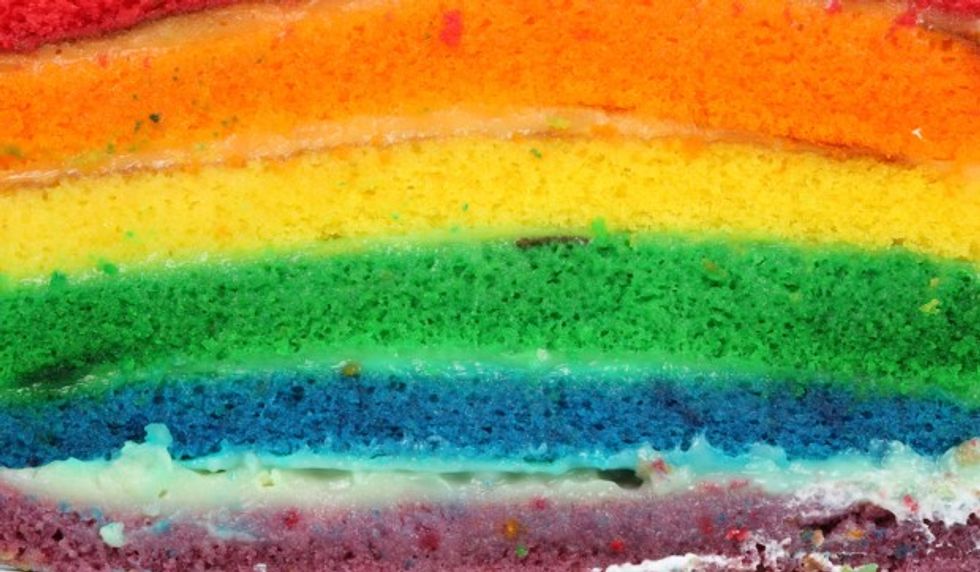
(Source: Shutterstock)

At this point, I'd be lying if I said I wasn't genuinely worried about the current state of free speech and religious freedom in America.
Consider that officials in Oregon are fining bakers Aaron and Melissa Klein — the married parents of five children — $135,000, because they wouldn't make a wedding cake for a lesbian couple.

I actually just paused as I'm writing this to consider the absurdity of that reality. It seems unbelievable that declining one, single cake would yield such a massive penalty, regardless of where one stands on the issue.
Let's just break this down: A family that has already lost its bakery due at least in part to the outrage over their decision to stand by their values and decline making a gay wedding cake could be financially ruined. And all in the name of "inclusiveness."
I'm the first person to be disgusted, depressed and repulsed by discrimination, but this situation, like many others involving Christian business owners who feel uncomfortable being party to same-sex nuptials, is unique. While the Kleins, among others, are accused of shielding their purported "bigotry" by hiding it under the guise of faith, reality paints a different picture.
When it comes to marriage, the Bible is pretty clear on the theology, or, to be as fair as possible, most Christians tend to agree about what they believe the Bible is saying on the matter. Sure, there are debates between progressives and conservatives over same-sex nuptials, but the vast majority of Christians hold to the traditional view of what marriage means in the eyes of the Almighty.
But don't just take my word for it. A recent poll found that 94 percent of evangelicals opposed gay marriage legalization, with 86 percent believing that the decision will negatively impact American society; only 10 percent said that they believe offering marriage rights is morally acceptable.
[sharequote align="center"]We live in America with a First Amendment that protects us. Unless we're Christian bakers.[/sharequote]
Critics will say that evangelicals skew pretty conservative, and they're right. So, what happens when we add in those mostly liberal mainline denominations to include all believers who say their faith is important to them, and that they attend church regularly? The proportion of opposition decreases, but it's still at 66 percent among all practicing Christians.
My purpose here isn't to argue on theological lines for or against gay marriage, rather it is to showcase the fact that views on the matter have a general agreement — or at least a majority view — among Christians. Traditional marriage has historical rooting and understanding in the church.
That doesn't mean that Christians can't embrace gay marriage legalization, while also holding to a traditional view, as many do, but here's my main point: The Kleins didn't act on some benign, bizarre or conjured up form of bigotry that they randomly embedded into their faith.
The bakers made a decision based on their understanding, and the majority understanding of those within their faith. While there's a legitimate debate over how Christians should handle these situations, calling the Kleins and others like them "bigots" seems a bit extreme.
And since the word "bigot" has been so utterly abused in recent times, allow me to offer up the definition, so that we can have a clearer lens through which to view the issue:
Bigot: a person who strongly and unfairly dislikes other people, ideas, etc. : a bigoted person; especially : a person who hates or refuses to accept the members of a particular group (such as a racial or religious group)
The Kleins have never expressed "dislike" or "hate," and in fact have had no problem accepting anyone. In fact, they've repeatedly said that they would and have served gay customers; they simply did not want to provide service to a same-sex wedding, as it conflicted with their views.
Listen to the Kleins share their story below:
Listen, no one needs to agree with the Bible's definition of marriage. In fact, people are free to dismiss it, disagree with it — even denigrate it. After all, we live in America with a First Amendment that protects us. Unless we're the Kleins, apparently.
Unfortunately, one of the points that has been lost in this debate is the very reason why the majority of Christians hold a traditional view on sexuality. Many paint these perspectives as being outdated and out of sync with the times, which is fine, but so patently dismissing theological opinions without taking the time to actually understand them is disingenuous.
As I reported, Pastor Tim Keller, a theologian and the founder of Redeemer Presbyterian Church in New York City — arguably among the most well-known and respected faith leaders of the day — recently tackled the ongoing debate over the “relationship of homosexuality to Christianity,” comprehensively detailing his perspective in what might be one of the better pieces I've seen on the issue.
He drew parallels from Genesis 1 that he said affirm the traditional understanding of sexuality, particularly the notion that two “complementary pairs” are seen being brought together in the literature to affirm one another, proceeding to cite theologian N.T. Wright in claiming that the uniting of male and female in Genesis 2 is “the climax” of this paradigm.
“In Genesis 1 you see pairs of different but complementary things made to work together: heaven and earth, sea and land, even God and humanity,” Keller wrote. “It is part of the brilliance of God’s creation that diverse, unlike things are made to unite and create dynamic wholes which generate more and more life and beauty through their relationships.”
He continued, “That means that male and female have unique, non-interchangeable glories — they each see and do things that the other cannot. Sex was created by God to be a way to mingle these strengths and glories within a life long-covenant of marriage.”
Keller wrote that it is the institution of marriage in which this union most intensely takes place, adding that there is a biblical and God-ordained vision that sustains humanity.
“Without understanding this vision, the sexual prohibitions in the Bible make no sense. Homosexuality does not honor the need for this rich diversity of perspective and gendered humanity in sexual relationships,” Keller continued. “Same-sex relationships not only cannot provide this for each spouse, they can’t provide children with a deep connection to each half of humanity through a parent of each gender.”
You can read the rest of his analysis here.
Of course, this doesn't solve the issue, as it is complex — and people will still disagree. But I'm sharing this to highlight that people of faith have a very well-thought out reasoning to corroborate their views, and even if one dismisses Keller and others for their perspective, the least we can all do is respect one another's disagreement.
As for the bakery issue, it's important to note that not every Christian would decline to make a gay wedding cake, but some would and clearly have, based on the precept that it is a violation of their sincerely held religious views about marriage as they see it under the eyes of God.
Individuals like the Kleins take serious Colossians 3:17, which reads, "And whatever you do, whether in word or deed, do it all in the name of the Lord Jesus, giving thanks to God the Father through him," believing that their businesses are an extension of their very being.
The issue of businesses declining service based on opposition to gay marriage is tricky, but I wouldn't force a Christian photographer or wedding venue to serve a gay wedding any more that I would a gay baker or photographer to serve a pro-traditional marriage event — or, on the more extreme end, an anti-gay event organized by Westboro Baptist Church.
At the end of the day, there has got to be a middle ground on the issue. As I wrote in an April op-ed:
Few of the most enraged activists have fairly considered that there’s a major difference between the owner of a diner claiming that he won’t serve a gay couple breakfast and a wedding-related vender declining services for same-sex nuptials.Many attempt to conflate the two, but it’s impossible to look objectively at the situation and conclude that these scenarios are homogeneous. Few Christian business owners, if any, would embrace the former scenario.
But it's not just the plight of the Kleins that concerns me. Since the U.S. Supreme Court legalized gay marriage on June 26, there have been calls to strip churches that don't embrace gay marriage of their tax exempt statuses, concerns that Christian colleges with sexual ethics policies will be targeted, and calls from at least one military activist that all chaplains who oppose gay marriage be removed from the military.
There's even a Christian university in Canada that's in the midst of a brutal battle for accreditation for its new law school after a number of law societies in various provinces voted not to allow its graduates to practice law. Why, you ask? Because the university has a sexual ethics policy that confines sex to married couples comprised solely of a man and a woman.
Listen to actress Candace Cameron Bure discuss the Kleins and religious freedom below:
So, when we look at that definition of "bigot" again and we assess where we are as a culture, it's probably prudent to be a bit more careful. Gays have traditionally been terribly mistreated by hateful bigots in the past, but now there are some activists who are — to borrow from the definition of "bigot" — refusing "to accept the members of a particular group" (i.e. Christians).
It's not about fear mongering. It's possible that churches will be fine, colleges will be left alone and military chaplains' rights will stay in tact, but with the trajectory we're on following the Kleins' $135,000 fine, it's far past time for people to start paying attention; the future of religious freedom in America is uncertain, to say the least.
As Americans of all faiths and perspectives, we should be called to a higher standard of being able to love and respect one another, even when we have intense disagreements about all facets of life, including biblical marriage.
–
TheBlaze contributor channel supports an open discourse on a range of views. The opinions expressed in this channel are solely those of each individual author.
Billy Hallowell